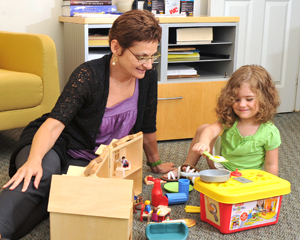Parent-child play therapy relieves depression …

Parent-child play therapy relieves depression in preschoolers
A form of play therapy between parents and their toddlers can relieve depression in preschoolers, according to child psychiatry researchers at Washington University School of Medicine in St. Louis.
Known as parent-child interaction therapy, the play-based technique has been used successfully to treat hyperactivity and disruptive disorders. The researchers adapted it, adding a focus on emotional development, to test whether it could help parents teach their children how to regulate negative emotions, such as guilt and sadness.

Mark Gilliland Photography Joan L. Luby, MD, is diagnosing and working to develop therapies to treat clinical depression in children as young as three.
Play therapy sessions put parents and their children in one room while a therapist observes from a nearby room.
Results from the pilot study are published online in the journal Depression and Anxiety. Investigators caution that the findings are preliminary, involving only eight preschoolers, but they call the outcomes dramatic. Depression symptoms improved in all of the children studied.
“There was a very large effect,” says principal investigator Joan L. Luby, MD, professor of child psychiatry. “From our past research, we know that children as young as three can suffer from clinical depression, but how to treat it is an open question. Most infant-preschool mental health providers want to avoid drug treatment, and there is evidence that psychosocial interventions can be uniquely effective in young children. Our findings certainly suggest that may be true for depression.”
Therapy took place during 14 sessions over 18 weeks. Depression severity scores decreased 44 percent. Following therapy, most child participants no longer met the diagnostic criteria for depression.
The study was conducted as an open trial. That is, all children received the investigational play therapy. Luby’s group since has conducted a more rigorous randomized, controlled study that put some parents and preschoolers into play therapy, while other parents met weekly with a psychologist to learn about normal emotional development. The researchers currently are analyzing the data from that study.
The original therapy was developed in the 1970s by Sheila M. Eyberg, PhD, distinguished professor of clinical and health psychology at the University of Florida in Gainesville.
“The original form of parent-child interaction therapy had two components,” says lead author Shannon N. Lenze, PhD, an instructor in the Department of Psychiatry. “One was a child-directed interaction, and the other was parent-directed. The first encourages the parent to use effective praising techniques, to play games the child wants to play, to get down on the child’s level and be enthusiastic. The second component teaches the parent about effective discipline using a very specific ‘time out’ to help the child learn to obey parent commands.”
A third novel component, which was developed for this study, involves emotions and helps parents learn to help their child more effectively regulate them.
“It’s designed to help parents understand what’s going on with their child,” Lenze says. “It also trains parents in how to show empathy for the child and the emotions that child is displaying, as well as what to do about those emotions.”
The focus on emotions comes from the belief that emotionally healthy people are able to experience a broad range of emotions, both positive and negative. Healthy people, Luby says, can feel emotions at peak intensity but also can regulate them. Depressed children often can’t do that.
“It’s healthy to be able to experience sadness or guilt, but it’s not healthy to be overwrought with guilt and preoccupied with sad things,” Luby explains. “We work to help parents tolerate a child’s emotion, as opposed to just trying to quash it or to change the subject and distract the child, which is a very typical parental technique.”
During therapy sessions, therapists like Lenze observe parent-child interactions through a one-way mirror. They talk directly to the parents, who wear an earpiece and a microphone, allowing the therapists to coach them while they are interacting with their child. This allows the therapist to deliver specific instructions about how to deal with the child’s emotions in real time.
“That’s one of the interesting techniques that Eyberg developed,” Luby says. “Because the therapist is watching and coaching, the parent becomes the ‘arm of the therapist’ during the treatment session, which puts the parent and therapist on the same page. I think that may be one of the reasons why the technique seems to be so effective.”
Another reason may involve brain development.
“The brain is undergoing tremendous, rapid change during this period of development,” Luby says. “We think it is important to identify depression and intervene early so that we might prevent it from becoming a chronic and relapsing disorder.”
________________________________________
* Lenze SN, Pautsch J, Luby J. Parent-child interaction therapy emotion development: a novel treatment for depression in preschool children, Depression and Anxiety, Early View, published online Dec. 13, 2010. DOI: 10.1002/da.20770
** This work was supported by grants from the National Institute of Mental Health of the National Institutes of Health.
*** Washington University School of Medicine’s 2,100 employed and volunteer faculty physicians also are the medical staff of Barnes-Jewish and St. Louis Children’s hospitals. The School of Medicine is one of the leading medical research, teaching and patient care institutions in the nation, currently ranked fourth in the nation by U.S. News & World Report. Through its affiliations with Barnes-Jewish and St. Louis Children’s hospitals, the School of Medicine is linked to BJC HealthCare.
**** The above story is reprinted from materials provided by Washington University School of Medicine. The original article was written/posted By Jim Dryden



















Great work! I agree that it is important for parent’s to empathize with their child’s emotions rather than brushing it off, squashing it or even disciplining it. Of course children are unable to regulate their emotions. Empathizing with the child teaches them respect and understanding. This study correlates with the work of Dr. Harvey Karp, M.D.
Tom
Certified National Counselor